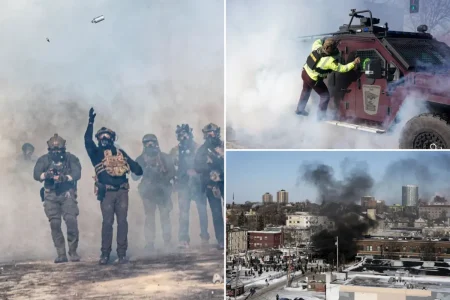Hamas Outlines Conditional Response to Trump’s Gaza Peace Proposal
Militant Group Sets Terms for Ceasefire as Diplomatic Efforts Intensify
In a significant development that could potentially shape the trajectory of the nearly two-year conflict in Gaza, Hamas has formally responded to President Trump’s recent peace initiative with a series of conditional requirements. The militant group’s carefully worded statement, released through diplomatic channels yesterday, represents the first substantive engagement with the administration’s proposal since its announcement last month. While Hamas officials characterized their response as “constructive and pragmatic,” initial analysis suggests considerable daylight remains between their position and those of both the White House and Israeli leadership.
The response comes amid escalating humanitarian concerns across the Gaza Strip, where civilian infrastructure has been devastated by prolonged fighting. According to United Nations estimates, over 70% of residential buildings have sustained significant damage, while critical services including healthcare, water purification, and electrical distribution remain severely compromised. “What we’re witnessing is an unprecedented crisis that demands urgent diplomatic intervention,” explained Dr. Sarah Hadid, Middle East policy analyst at the International Crisis Group. “Hamas’s willingness to engage with the proposal, however conditionally, opens a narrow window for potential de-escalation that all parties should seriously consider.”
Hamas Demands Include Prisoner Release, Withdrawal of Forces
Central to Hamas’s counteroffer is a demand for the comprehensive release of Palestinian prisoners currently held in Israeli detention facilities. According to persons familiar with the document, the militant organization has specifically prioritized the release of long-term detainees, including those serving multiple life sentences for involvement in previous attacks against Israeli citizens. This requirement represents a significant expansion of prisoner exchange parameters beyond what Israeli negotiators have previously indicated as acceptable. Additionally, Hamas has stipulated a complete withdrawal of Israeli military forces from all Gaza territories, including buffer zones established during the current conflict, and guarantees against future incursions.
The group has also reportedly demanded substantial international reconstruction aid without Israeli oversight or restrictions on materials entering the territory. “Hamas is essentially seeking to emerge from this conflict with greater autonomy and fewer constraints than existed before hostilities began,” noted Regional Security Correspondent Jonathan Peretz. “This position reflects their calculation that time may be working in their favor as international pressure mounts on Israel to end military operations.” The militant organization’s leadership, believed to be operating from secure locations both within Gaza and abroad, has further insisted on political recognition from international bodies as part of any sustainable agreement – a condition that has historically represented a red line for both American and Israeli negotiators.
White House Deliberates Response as Regional Allies Weigh In
President Trump’s administration has maintained careful public neutrality following receipt of Hamas’s response, with State Department officials describing an ongoing “thorough review process.” Behind closed doors, however, diplomatic sources indicate active consultations with Israeli counterparts and regional mediators including Egypt and Qatar, both of which have played critical roles in previous ceasefire negotiations. The administration’s original proposal, details of which were not fully disclosed publicly, reportedly centered on a phased cessation of hostilities coupled with humanitarian access guarantees and preliminary discussions on longer-term governance arrangements for Gaza.
“The administration finds itself in a delicate balancing act,” explained former Middle East envoy Ambassador Richard Holloway. “They need to maintain credibility with Israeli security concerns while simultaneously demonstrating progress toward ending a conflict that has generated significant international criticism.” The timing of Hamas’s response carries additional significance given the approaching American electoral cycle, with some analysts suggesting the group may be calculating that pressure for a foreign policy achievement could increase White House flexibility on previously rigid conditions. Regional allies have meanwhile adopted varying positions, with Egypt reportedly advocating for flexibility regarding border control arrangements and Qatar offering financial guarantees for reconstruction initiatives.
Israeli Leadership Signals Skepticism While Leaving Door Open
Initial reactions from Israeli officials suggest deep skepticism regarding Hamas’s sincerity, though Prime Minister Benjamin Netanyahu’s government has refrained from outright rejection. “We will examine any proposal through the lens of our non-negotiable security requirements and the imperative to prevent Hamas from rearming,” stated Defense Ministry spokesperson Eliana Berkovitz during yesterday’s press briefing. Military leadership has privately expressed concerns that premature withdrawal could allow Hamas to reconstitute combat capabilities, while right-wing coalition partners have publicly warned against any agreement that fails to achieve “complete neutralization” of the militant group’s governance capacity.
Nevertheless, domestic political considerations may create openings for diplomatic progress. Recent polling indicates growing public fatigue with the conflict, with 58% of Israeli respondents now favoring negotiations toward a ceasefire provided security guarantees can be implemented. Economic pressures resulting from the prolonged mobilization of reserve forces and disruption to commercial activities in southern regions have further complicated the government’s calculus. “While the official position remains firm, there are pragmatic voices within security establishments acknowledging that military operations alone cannot produce sustainable political outcomes,” noted Dr. Avi Shlaim, professor emeritus of international relations at Oxford University. “The question becomes whether these voices can influence policy direction amid competing hardline perspectives.”
Analysis: Complex Path Forward Despite Diplomatic Opening
Security and diplomatic experts broadly agree that while Hamas’s response does not satisfy core Israeli or American requirements, it represents a potentially significant diplomatic opening that warrants serious engagement. The conditional nature of the group’s position allows negotiating room while satisfying internal political necessities to project strength to its base. “What we’re seeing is classic conflict negotiation behavior,” explained Dr. Elena Martinez, director of the Center for Conflict Resolution Studies. “Initial positions staked out publicly often differ substantially from what parties will eventually accept through confidential diplomatic channels.”
Critical challenges remain, however, particularly regarding verification mechanisms and sequencing of reciprocal actions. Previous ceasefire attempts collapsed amid mutual accusations of non-compliance, undermining trust essential for implementing complex arrangements. Regional dynamics further complicate prospects, with Iranian influence and involvement of other militant factions introducing additional variables. Nevertheless, mounting humanitarian imperatives may ultimately force pragmatic compromises from all sides. “The sheer scale of suffering has created moral and practical imperatives that cannot be indefinitely ignored,” observed Humanitarian Affairs Coordinator Michael Stephenson. “What remains uncertain is whether this growing pressure will translate into the political courage necessary for difficult concessions.” As diplomatic efforts intensify in the coming days, close observers will be watching for subtle shifts in position that could signal genuine movement toward ending the devastating conflict that has claimed thousands of lives and reshaped regional dynamics across the Middle East.







